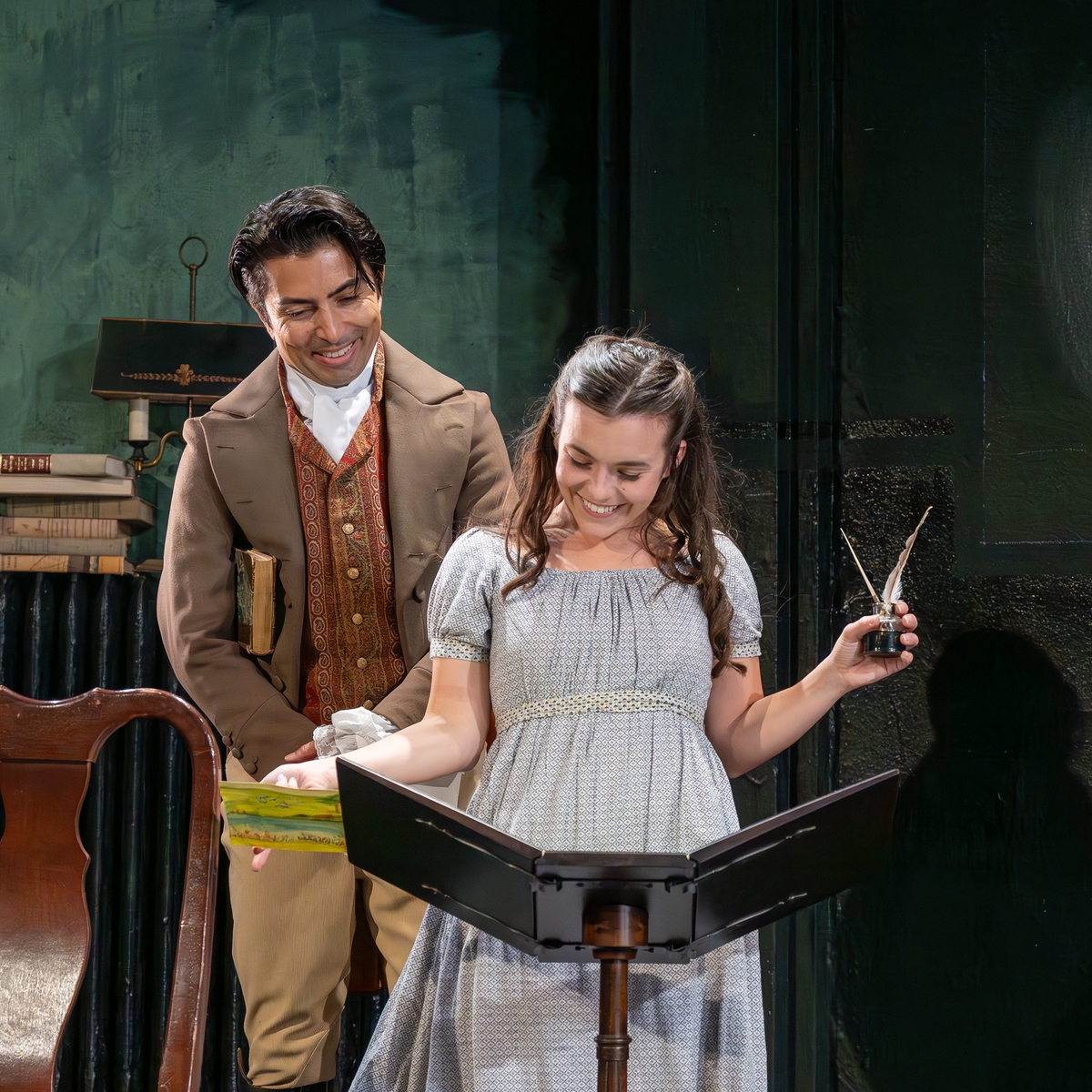NYC
In Off-Broadway Arcadia, Heart And Mind Are At Odds
by | Nov 20, 2023 10:52 am
Post a Comment | E-mail the Author
Posted to: Theater

Ashley Garrett Photo
Septimus (Shaun Taylor-Corbett) tutors Thomasina (Caroline Grogan) in Arcadia.
Arcadia
Bedlam at The West End Theatre
263 West 86th St.
New York City
Through Dec. 10
The West End Theatre is on the second floor of a church. To get there, you have to walk up a marble staircase. The entrance is grand but archaic -– thinking about how beautiful it is quickly leads to thinking about how much grander it must have been in whatever former glory you imagine it once had. The theater itself is down the hall, part black box, part chapel. Underneath the vaulted ceiling, you sink into a pew of red-cushioned seats and wait for the show to begin.
It’s a fitting primer for Bedlam’s thoughtful off-Broadway revival of Arcadia, a play whose two timelines are set centuries apart at the same English country estate.
In 1809, Thomasina Coverly (Caroline Grogan), the precocious daughter of Lord and Lady Croom (Lisa Birnbaum), studies mathematics and physics with her tutor, Septimus (Shaun Taylor-Corbett), a friend of Lord Byron. Meanwhile, the rest of the estate is too preoccupied by accusations of adultery and plans for a new garden to recognize her groundbreaking discoveries.
In the present, Hannah Jarvis (Zuzanna Szadkowski), a historian is studying the estate’s gardens for her next book when finds her work interrupted by the arrival of an arrogant academic, Bernard Nightingale (Elan Zafir). As their research areas and personal lives clash, secrets from the Regency timeline begin to emerge.
Written by Tom Stoppard, the 1993 play is an exquisite portrait of the interdependence of intellectualism and human emotion. It’s full of people who fashion themselves into walking, talking brains to neglect their feelings — and people who feel so ardently that they’re blind to rational thought.
Stoppard alternates between the play’s two timelines, weaving lessons about iterated equations, treatises on Romantic poetry, and arguments about sex throughout the story. On the page, the effect is elegant -– with time to mull over dense chunks of dialogue and flip back to previous moments, each scene illuminates the previous one. In production, Stoppard’s cerebral text runs the risk of becoming dry and impenetrable.
The play’s challenges make it an ideal playground for Bedlam. Run by director Eric Tucker, the small off-Broadway company has become well-known for their high-energy, deconstructed adaptations of classic works like Sense and Sensibility and The Crucible. Here, Tucker rejects the temptation to go full period piece. Instead, he makes sure that the audience can’t distance themselves from the play.
The house lights stay on for most of the three-hour production, and actors make unconventional entrances, sometimes shuffling in from between rows of seats or walking in front of an ongoing scene. Rather than having the cast indicate place by speaking in British accents, the play begins with Septimus writing ENGLAND across a blackboard on the set. It works, to an extent. I could feel myself working to keep up with each rhetorical turn. I had a clear sense that the actors could see me, just as well as I could see them.
But by stripping Arcadia down to its most digestible essentials, Bedlam misses the pulsing heart at its center.
Arcadia is a play of ideas, but it’s the play’s relationships that make its ideas matter. When Septimus skewers Ezra Chater’s poetry, his critique is particularly biting because he’s been having an affair with Chater’s wife. Similarly, Bernard’s obsessive disdain of Hannah’s research gets complicated by his growing attraction to her. Hannah, in turn, dives headfirst into her work to avoid Bernard and her maybe-fiancé, Valentine, the estate’s current heir and an antisocial mathematician.
Szadkowski’s layered performance as Hannah is the play’s grounding force. She plays the walls of bluntness and sarcasm that Hannah puts up around herself then effortlessly melts them as Hannah gets warmer and more vulnerable. There’s a palpable humanity to her scenes in the contemporary story, which makes them the most compelling. Throughout the 19th century timeline, it often felt as though each actor was working so hard to communicate their character’s ideas that they struggled to connect with each other. Particularly in the play’s climactic group scenes, where the characters hurl accusations and secrets at each other, the pacing dragged to the point that it obscured the scene’s throughline.
Tucker’s big twist in Arcadia comes at intermission. You leave the theater and return to find its orientation flipped. For the second act, you sit in a white wooden chair fit for a Regency garden party as the actors finish the play from what was once the audience. The whole cast sits in the seats, each character visible but occupied by a book, a newspaper, or a laptop when they aren’t in a scene. Throughout the act, as characters from the contemporary timeline dress up in 18th century costumes for a party, it gets harder to tell who is from when.
Here, Bedlam finds the playfulness and joy that the rest of the production lacks. They toss tailcoats rapid-fire around the rows of seats. They illuminate night scenes with handheld flashlights. They work as an ensemble, pulling together simple means to creatively tell the end of a sweeping story. Septimus and Thomasina waltz by flashlight in the play’s final beats. It’s simple. It’s beautiful. For a moment, the heavy, high-concept direction fades away, and we’re left with something delicate: two people dancing on the last night of one of their lives.
NEXT UP: I’ll be reviewing The Gardens of Anuncia at Lincoln Center.